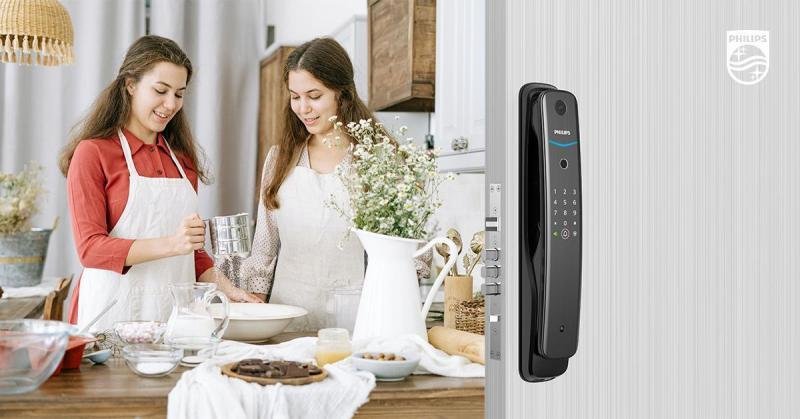In this age of quickly developing technology, smart locks have become a desirable feature for many people’s houses. However, many prospective customers wonder: “Why are smart locks so expensive?” The price tags on these cutting-edge locks frequently need clarification, although there is a wealth of alternatives on the market from reputable manufacturers like Philips.
This article will examine the many elements that contribute to the high prices of smart locks, focusing on the Philips smart lock as a prominent example of excellent quality in the field of home automation thanks to its unique combination of cutting-edge features, solid security, and stylish appearance.
What are the Reasons of “Why Smart Locks So Expensive”?
Smart locks are a stylish and hassle-free option for home security. Tap the lock, press a button on your phone, use your voice, or walk up to the door with your phone in your pocket, and the smart lock will open automatically. However, the price tag for all that ease of use may be relatively high. Why are smart locks so expensive? Here are some explanations.
- Security
A smart lock’s higher price tag reflects that it provides a higher level of security. An alarm system includes digital and smart locks to deter robbers. These locks have an alarm that produces a loud noise or sends a message to your phone if they detect a security violation.
The most high-end digital and smart locks on the market, like Philips, employ asymmetric cryptography and PKI encryption technologies if that level of security doesn’t satisfy your needs. Those who aren’t proficient in computers may rest confident that this system has never been compromised. This is so because it uses essential public and private values to accomplish its goals.
A complex method encrypts the private key to decipher it only with the public key. Obtaining the sophisticated programming abilities necessary for working with asymmetric cryptography takes time and effort. It would help if you realized that this guarantees your lock cannot be broken.
- Performances and Capabilities
Smart locks provide many valuable features and conveniences, so notice them. For example, door locks and unlocks may be detected by presence sensors. If you ever have the dreadful sense that you forgot to lock the door, but you’re halfway in the vehicle, and the elevator to your building is 30 floors up, you must check your phone app.
Touch less door unlocking is now possible with fingerprint recognition technology included in the digital and smart locks of Philips. Growing even something as commonplace as remote control technology takes years so your lock can connect reliably with your mobile devices.
The truth is that these fantastic useful things also imply that it is more challenging to install and thus more expensive. Therefore, you should only invest in reputable brands that guarantee high-quality craftsmanship and offer excellent after-sale service if you experience any issues.
- Implementation and Connectivity
Investment is necessary for the long-term maintenance and improvement of any technology, and smart locks’ ability to connect with your iOS and Android smartphones is no exception. Consider the example of voice-activated devices.
Due to apps like OK Google and Siri, voice commands are now second nature. Because of the benefits of accessibility and convenience, more and more individuals are beginning to see that investing in voice activation technology is worthwhile. This will hit you particularly hard when you’re in the grocery store and have your heart set on a watermelon.
New technologies naturally have a higher price tag due to the resources put into their development. There is an increasing value on this as technology develops and grows more complex. Because specialized applications need to operate sure digital locks, it is crucial to maintain application development throughout the product’s active and in-use lifespan.
Your app has to have the flexibility to develop and scale in response to changing market conditions, user preferences, and technological advancements. Philips is one of several companies that prioritize app longevity, scalability, and maintenance.
- Advance Technology
Companies manufacturing smart and digital locks are constantly investing in and creating new technologies to provide their consumers with more excellent options. Such are locks that use face recognition software. You can get one of these for your house, not just in spying flicks. For instance, Philips will soon release its face recognition capability.
- Alert Indicators
For added security, some of these locks, like the Philips Smart Lock, have alarms to scare away would-be robbers. This lock has a built-in alarm that will go off and notify your phone if anybody attempts to tamper with your safety.
In addition, the Amazon Key app may provide delivery personnel access to your house so they can leave items inside rather than at your doorstep.
- Indicators of Presence
Smart locks have sensors that detect when the door is open, closed, locked, or unlocked. Adding presence sensors raises the price of smart locks because of the increased installation difficulty. They must have high-tech means of tracking the present door condition.
- Labour Expenses
Installing a smart or digital lock requires manual skill to attach the lock to the door. The technical competence to make sure the power source is wired correctly and the lock communicates well with your other smart devices (if it has such a feature). A fee is associated with hiring a locksmith who is proficient in knowledge due to the complexity of the lock.
- Encryption and Cryptography
Philips is one of the most costly smart locks because it employs a robust cyber security model. This lock’s asymmetric cryptography and PKI encryption have yet to be cracked. Both a public and a private key are required for asymmetric cryptography.
Some methods encrypt the private key so that it can only be deciphered with the public key. Securing a smart lock using asymmetric cryptography demands time, money, and expertise in computer programming.
- Abundant Storage
The Philips Smart Door Lock is one example of a high-quality smart lock with sufficient onboard storage to accommodate a variety of user passcodes and fingerprints. More than 200 fingerprints and 150 PINs are compatible with this device. Five distinct passcode options are available for this lock, including permanent, one-time, timed, cyclic, and bespoke.
However, this makes it an excellent option for those who earn money from short-term rentals. However, the more data storage a lock requires, the more it will cost to manufacture and maintain. These locks have more advanced software and data storage systems.
- Remote Management
Whether you configure your smart lock with Bluetooth or WiFi, remote control technology is an added expense. The Philips Smart Lock may function independently, providing access through a password emailed to your phone or a fingerprint reader.
Locking and unlocking your Philips Smart Lock may be done remotely using apps and controls on your phone. Locks with remote control technology are more costly because they need more complex software. The price of WiFi and Bluetooth-enabled remote control technology is similar, and both have their advantages.
For instance, Bluetooth will increase the rate at which your phone’s battery drains, but it may be used in the dark. WiFi-enabled smart locks often stop operating and refuse to unlock after a power outage.
Final Thoughts
In sum, there are several causes behind the sharp increase in the price of smart locks. Premium solutions, such as the Philips smart lock, come with premium prices due to the high quality and reliability of the associated technology and brand name. The cost results from extensive research and development, high-grade encryption, and the need to work with various smart home ecosystems.
Additional factors include a specialized market and the need for innovative security measures. Smart locks are now out of reach for many people because of their high pricing, but as technology advances, we anticipate that these costs will decrease.




